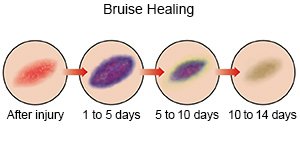Black Eye
Medically reviewed by Drugs.com. Last updated on Aug 4, 2025.
A black eye is a bruise of your eye or the area around it. A black eye is caused by an injury to your eye, such as a direct blow from a sports injury. Over time, the bruise will change from blackish-blue to brown, green, or yellow. The bruise may spread down your cheek. It may take up to 3 weeks for the bruise to fade.
 |
DISCHARGE INSTRUCTIONS:
Call your local emergency number (911 in the US) if:
- You cannot move or walk the way you usually do.
- You are confused.
Return to the emergency department if:
- You have a severe headache.
- You have nausea or are vomiting.
- You are dizzy or feel faint.
- You have changes in your vision, such as double vision or vision loss.
- You cannot move your eye.
- You have blood or fluid draining from your eyes or nose.
Call your doctor if:
- You have blood on the surface of your eyeball.
- You have questions or concerns about your condition or care.
Medicines:
- Acetaminophen decreases pain and fever. It is available without a doctor's order. Ask how much to take and how often to take it. Follow directions. Read the labels of all other medicines you are using to see if they also contain acetaminophen, or ask your doctor or pharmacist. Acetaminophen can cause liver damage if not taken correctly.
- NSAIDs , such as ibuprofen, help decrease swelling, pain, and fever. This medicine is available with or without a doctor's order. NSAIDs can cause stomach bleeding or kidney problems in certain people. If you take blood thinner medicine, always ask your healthcare provider if NSAIDs are safe for you. Always read the medicine label and follow directions.
- Take your medicine as directed. Contact your healthcare provider if you think your medicine is not helping or if you have side effects. Tell your provider if you are allergic to any medicine. Keep a list of the medicines, vitamins, and herbs you take. Include the amounts, and when and why you take them. Bring the list or the pill bottles to follow-up visits. Carry your medicine list with you in case of an emergency.
Manage your symptoms:
- Apply ice on your eye for 15 to 20 minutes every hour or as directed. Use an ice pack, or put crushed ice in a plastic bag. Cover it with a towel. Ice helps prevent tissue damage and decreases swelling and pain.
- After the first 24 hours, apply heat on your eye for 20 to 30 minutes every 2 hours for as many days as directed. Heat helps decrease pain and swelling.
- Keep your head and back elevated when you rest , such as in a recliner. Place extra pillows under your head and neck when you sleep in bed. This will help decrease swelling.
- Limit activity. Do not exercise or lift heavy objects for 48 hours. This could cause more bleeding under the skin.
Follow up with your doctor as directed:
Write down your questions so you remember to ask them during your visits.
© Copyright Merative 2025 Information is for End User's use only and may not be sold, redistributed or otherwise used for commercial purposes.
The above information is an educational aid only. It is not intended as medical advice for individual conditions or treatments. Talk to your doctor, nurse or pharmacist before following any medical regimen to see if it is safe and effective for you.
Further information
Always consult your healthcare provider to ensure the information displayed on this page applies to your personal circumstances.
